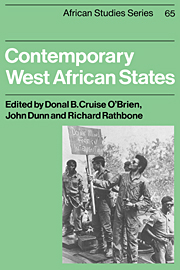9 - Senegal
Published online by Cambridge University Press: 10 December 2009
Summary
On the eve of President Leopold Senghor's retirement, the Senegalese state appeared to be ‘a quite remarkable success story’. This success was attributed to the emergence of an authentic national political culture, to relatively viable linkages between the communities (local, religious or ethnic) and the state. The success was manifest in the capacity of the governmental party as an effective political machine. The quality of political leadership made the Senegalese state a ‘uniquely effective political apparatus’, and an instrument of stability although still unable to initiate an effective development policy. The state in Senegal at least was not a political ‘artifact’ working in a void, without effective links with society at large.
Today the problem is to know if the success continues, in a new context of political transformation, with a very precarious economic and social situation. Can the ‘democratisation’ initiated by Senghor, and pursued with still more determination by his successor Abdou Diouf, respond to the rise of a militant Islam, to the development of a regionalist movement in the Casamance, to the discontent provoked by austerity measures under the guidance of the International Monetary Fund?
Starting from these questions, we must first examine the mechanics of the democratic renewal, and then look to the changes that have occurred in the relation between the state and society, the changing forms of hegemony.
- Type
- Chapter
- Information
- Contemporary West African States , pp. 145 - 164Publisher: Cambridge University PressPrint publication year: 1990
- 14
- Cited by

